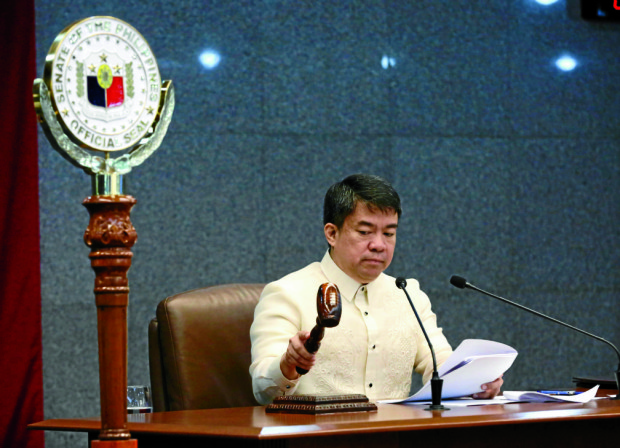The rushed burial of the late dictator Ferdinand Marcos at the Libingan ng mga Bayani may be undone as several remedies may address the issue when the time comes, Senate President Aquilino “Koko” Pimentel III said Saturday.
“Of course, this being a political issue, let us not lose hope, because this can be reversed anytime,” said Pimentel, chief ally of President Rodrigo Duterte at the Senate.
Pimentel is strongly against Marcos’ burial; his father, former Senate President Aquilino Pimentel Jr., was among opposition leaders detained during the strongman’s repressive martial rule.
It was the President, whose father Vicente served in the Marcos Cabinet, who had allowed the late dictator’s interment at the LNMB. Pimentel, who heads the President’s party, said he is not keen to raise the matter again to Mr. Duterte as Marcos has already been buried.
But he said, Mr. Duterte could still have a “change of heart.” Or else, the next President could undo the burial.
“Then by 2022, when we have a new President and he believes that there are disqualified persons buried in the Libingan ng mga Bayani, then he can order their transfer, or their removal,” he told the Inquirer when reached by phone.
Pimental said the Commission on Audit (COA) may also “disallow all expenses connect with the burial once it reviews the transactions” of the Armed Forces of the Philippines (AFP), which was tasked to make the funeral arrangements.
Such disallowance would compel the military to “justify, explain or return the sum spent.”
“If it was allowed, then what was done must be reversed,” Pimentel said.
The senator noted that the state has remaining claims of money from the Marcoses, who is known to have amassed stolen wealth of about $5 billion to $10 billion.
“They owe the state a huge debt, and yet the state even gave them a favor,” he said.
“This is not because of the legal (aspect). It is because a benefit is given to a person or his family against which the government has financial claim, which has not been returned and/or repaid,” he continued.
The issue of Marcos’ burial also prompted Pimentel to file a measure that would set aside land within the LNMB for the burial of “Filipinos of historical interest,” separate from plots reserved for the military.
This area, per his proposal, shall be called Libingan ng mga Makasaysayang Pilipino, where former Presidents of the Philippines, statesmen, dignitaries, and national artists and scientists may be interred.
Creating such delineation would “preserve the LNMB as a military memorial consistent with the purpose intended” when it was established in 1947, he said.
As protests continued over the burial, Pimentel said Filipinos should continue exercising their constitutional rights and take the time for some reflection on how much we value lessons of history.
“This will strengthen our democracy. This will also show the people that the Philippines has a lot of problems, this is one of them but this is not the only one. So, therefore, this will also prompt us to value our time, value our priorities,” Pimentel said.
“Let us allow all of these exercises to happen and then we will learn some lessons, and we will be a better democracy, a stronger country and a more historically conscious people because of all of these developments,” he said.


